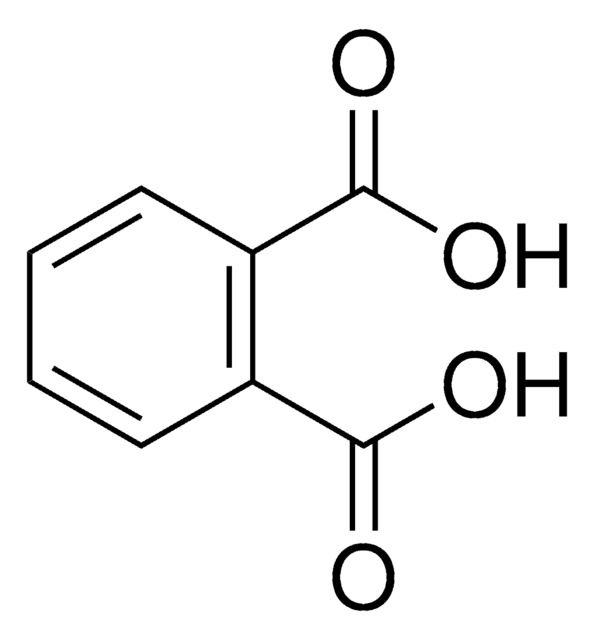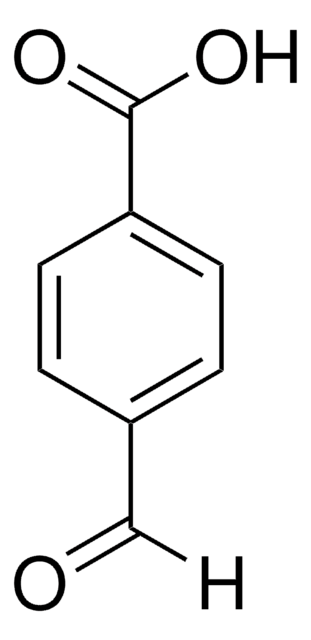I19209
Isophthalic acid
99%
Synonym(s):
Benzene-1,3-dicarboxylic acid
Sign Into View Organizational & Contract Pricing
All Photos(3)
About This Item
Linear Formula:
C6H4-1,3-(CO2H)2
CAS Number:
Molecular Weight:
166.13
Beilstein:
1909332
EC Number:
MDL number:
UNSPSC Code:
12352100
PubChem Substance ID:
NACRES:
NA.22
Recommended Products
Quality Level
Assay
99%
autoignition temp.
1198 °F
mp
341-343 °C (lit.)
SMILES string
OC(=O)c1cccc(c1)C(O)=O
InChI
1S/C8H6O4/c9-7(10)5-2-1-3-6(4-5)8(11)12/h1-4H,(H,9,10)(H,11,12)
InChI key
QQVIHTHCMHWDBS-UHFFFAOYSA-N
Looking for similar products? Visit Product Comparison Guide
Application
Isophthalic acid can be used as a reactant to prepare:
It can also be used as a ligand to synthesize:
- Poly(m-phenyleneisophthalamide) by polycondensation with m-phenylenediamine via thermal solid-phase polymerization reaction.
It can also be used as a ligand to synthesize:
- Metal coordination polymers by hydrothermal and sonochemical process.
- Isophthalic acid-zirconium(IV) nanocomposite, which is used as a precursor to prepare crystalline tetragonal ZrO2 via thermal decomposition method.
Storage Class Code
13 - Non Combustible Solids
WGK
WGK 2
Flash Point(F)
Not applicable
Flash Point(C)
Not applicable
Personal Protective Equipment
dust mask type N95 (US), Eyeshields, Gloves
Choose from one of the most recent versions:
Already Own This Product?
Find documentation for the products that you have recently purchased in the Document Library.
Customers Also Viewed
Suman Kalyan Pal et al.
Dalton transactions (Cambridge, England : 2003), (45)(45), 10021-10031 (2009-11-12)
Pyrene chromophores carrying different rigid rod spacer groups (ethynylene, ethynylene-phenylene-ethynylene, and ethynylene-bicyclo[2.2.2]octylene-ethynylene) and bound to TiO2 nanostructured materials via an isophthalic acid (Ipa) anchor group have been investigated using quantum chemical calculations in order to elucidate structural and electronic properties
Bo Xiao et al.
Nature chemistry, 1(4), 289-294 (2009-07-01)
Metal organic frameworks (MOFs) are among the most exciting materials discovered recently, attracting particular attention for their gas-adsorption and -storage properties. Certain MOFs show considerable structural flexibility in response to various stimuli. Although there are several examples of 'breathing' MOFs
Yue-Xiu Si et al.
International journal of biological macromolecules, 48(4), 700-704 (2011-03-05)
Using inhibition kinetics and computational simulation, we studied the reversible inhibition of tyrosinase by isophthalic acid (IPA). IPA inhibited tyrosinase in a complex manner with K(i)=17.8 ± 1.8mM. Measurements of intrinsic and ANS-binding fluorescence showed that IPA induced no changes
Sonochemical synthesis of two nano-sized nickel (II) coordination polymers derived from flexible bis (benzimidazole) and isophthalic acid ligands
Li Jun-Xuan, et al.
Polyhedron, 160, 92-100 (2019)
Jörg Lincke et al.
Inorganic chemistry, 51(14), 7579-7586 (2012-07-04)
An isomorphous series of 10 microporous copper-based metal-organic frameworks (MOFs) with the general formulas (∞)(3)[{Cu(3)(μ(3)-OH)(X)}(4){Cu(2)(H(2)O)(2)}(3)(H-R-trz-ia)(12)] (R = H, CH(3), Ph; X(2-) = SO(4)(2-), SeO(4)(2-), 2 NO(3)(2-) (1-8)) and (∞)(3)[{Cu(3)(μ(3)-OH)(X)}(8){Cu(2)(H(2)O)(2)}(6)(H-3py-trz-ia)(24)Cu(6)]X(3) (R = 3py; X(2-) = SO(4)(2-), SeO(4)(2-) (9, 10)) is presented
Our team of scientists has experience in all areas of research including Life Science, Material Science, Chemical Synthesis, Chromatography, Analytical and many others.
Contact Technical Service








